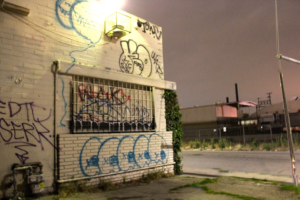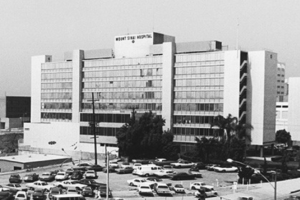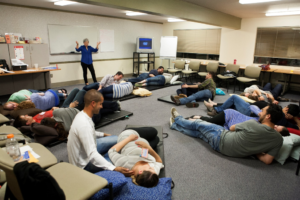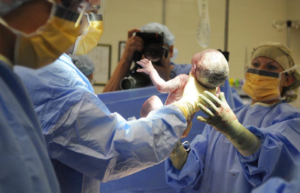First Born

Right after we moved to Los Angeles in the summer of 1975, my wife seemed tired all the time. Cindy told me what she thought was wrong. I sat in the lobby while the doctor examined her. When she came out of his office, she was smiling. “I’m pregnant,” she said.
We’d arranged to have lunch that day with the Latham lawyer who gave me my job offer. As I drove from Beverly Hills toward the restaurant in downtown Los Angeles, the prospect of having a child occupied my thoughts. Cindy was distracted, too, I guess, because we rode along in silence.
“Where are we?” Cindy said, after a long time.
I looked around. Graffiti-covered buildings and a chain-link fence topped with rolled barbed wire lined one side of the street; ramshackle houses with boarded up doors and windows on the other.
“We’re not in Beverly Hills,” I said in a hollow voice.
I’d apparently driven through downtown into a bombed-out neighborhood. It didn’t look safe, but we were in no danger of attracting the attention of bad guys. Our mustard-colored Pinto station wagon hadn’t been washed since Virginia; the stench of cat urine assaulted anyone within ten feet of it; and its front end bore the imprint of a telephone pole. Our sporty ride fit right in.
I found my way back to the restaurant. We met our friend and told him the news. When he toasted us, I dropped a glass of ice water in my lap.
“You seem stressed,” he said, grinning.
I grew more rattled as my role as a prospective dad took shape. Back in 1953, when my mother went into labor, Dad drove her to the hospital, dropped her off, and came home. About 3 a.m. the phone rang. “Yeah … Great … Thanks.” Dad told me I had a baby brother, and we went back to bed.

Mom said she didn’t remember anything about the birth. “They wheeled me into a room and put me to sleep. When I woke up, they handed me a baby boy.”
Times had changed by 1975. Dads didn’t go home and wait for a call. They were expected to be present in the labor and delivery rooms. This didn’t seem like a great idea to me. At Cedars Sinai, the hospital where our child would be born, a dad fainted in the delivery room, gashing his head on the corner of a steel cart and knocking himself unconscious.
“Maybe we should plan for me to stay in the waiting room,” I suggested to Cindy.
“I want you with me at the birth,” she said.
“Right,” I said.
The deal for moms had changed, too. No more knock-out drugs. Moms remained fully conscious during delivery, and a growing movement advocated natural childbirth without any medication, which was supposed to be better for the baby.
Cindy wanted a natural childbirth. Carol Burnett once said you could simulate the pain of labor by grabbing your lower lip and pulling it over the top of your head.

“Are you sure you want to do this?” I asked.
“I’m sure.”
“Right,” I said.
We enrolled in La Maze classes. The goal of the La Maze technique is to block the pain of childbirth through relaxation strategies and self-discipline.

We went to classes every week. The instructor said Cindy should stare at a focal point during a contraction and breathe through her mouth in short rhythmic bursts, making a little squeaking sound, “hee … hee … hee.” My job was to be her coach. I would set up the small stained glass medallion she chose for her focal point and breathe with her to help her concentrate.
It sounded like hocus-pocus nonsense to me, but it seemed to work. In the classes, the instructor told me to grab Cindy’s leg just above the ankle and apply pressure while she stared at the focal point and breathed the little hee hee’s. Each week I tightened my grip. By December, she could take all the pressure I could inflict without flinching.

As we approached the due date of mid-January, 1976, I began to think everything might go well. Then the doctors in California went nuts. To protest astronomical malpractice insurance premiums, they called a state-wide one month strike beginning January 1. We called our doctor in a panic. He was on strike, but he told us Cedars Sinai would maintain an insurance-covered Ob/Gyn on duty throughout the month to deliver babies. We were worried, but there was nothing we could do.
The night of January 17, Cindy said it was time. Miraculously, I drove her to the hospital without getting lost. A nurse examined her at 11:00 p.m. She was dilated three centimeters. I set up the medallion, and Cindy began the breathing regimen.
Nurses examined her throughout the night. The results were always the same. No progress. At 8:30 a.m. she was still dilated only three centimeters. I was exhausted and hyperventilated from coaching the hee hee’s, but Cindy seemed steady and determined.
The contractions got stronger shortly before nine. A couple of really big ones rolled through at the top of the hour. Then came an earthquake-sized mega-contraction. Cindy closed her eyes and grabbed the bed with her fists, fighting the pain. Suddenly, her water broke. Spectacularly. Shooting through the sheets to splash against the wall at the foot of the bed.
I ran for the nurse. “Ten centimeters!” she said, smiling ear to ear.
The delivery team wheeled Cindy down the hall so fast I had to run to keep up. We banged through big double-doors into blinding fluorescent light and gleaming stainless steel.
Amazingly, another woman was in the midst of childbirth at that very moment, and Cedars Sinai’s only covered Ob/Gyn was fully occupied with her!
Heroically, our doctor, who was waiting in the delivery room to watch over the birth, stepped up and saved the day. With no insurance coverage and knowing I was a lawyer, he took his place between the stirrups, his brown eyes smiling reassuringly above his surgical mask.
I stood on the other end of the table at Cindy’s head and held her hands.
“Push,” the nurse said. Cindy squeezed my hands and pushed.
In a mirror perched above the table, I saw the baby’s head crown.
Our doctor cupped his hands. Relaxed, calm, in love with his job, he was humming the song, If I Were a Rich Man.
“One more big push,” the nurse said.
 Despite her lower lip being pulled well over her head long before then, Cindy hadn’t screamed once up to that point. She clenched my hands and pushed with all her strength and groaned/screamed from way down deep inside.
Despite her lower lip being pulled well over her head long before then, Cindy hadn’t screamed once up to that point. She clenched my hands and pushed with all her strength and groaned/screamed from way down deep inside.
In the mirror, I saw our child slide out of the birth canal into our doctor’s gentle grasp.
“You have a son,” he said.
Tears streaming into my mask, I kissed Cindy’s forehead, so proud of her.
They cleaned up our baby and Cindy held him in her arms. I’ll never forget her smile.
Later, they placed him in a warming tray. I stood beside it and looked down at him. He stuck his left foot up in the air and made little circles with it.
I was forever changed in that moment. I still was, and would always be, the child of my parents, but that morning I became much more. I became a father.
Post Script: I stood beside Cindy in the delivery room twice more. Each birth was magical.
A generation later, I got lost on the way to the hospital in the middle of the night, but I managed to find the place just before Cindy and I became Granny and Papaw.



April 24, 2019 @ 8:07 am
Loved reading this! Brought tears to my eyes — beautiful writing. 🙂
April 24, 2019 @ 8:23 am
Thank you, Courtney, from one first born to another!
April 9, 2019 @ 12:54 pm
Laughed out loud several times. Great story. Thanks for sharing.
April 10, 2019 @ 8:15 am
Thanks, Ursula! Enjoyed the pics of your trip on FB!
April 7, 2019 @ 10:30 am
What precious memories! Each birth story is unique. I can remember my husband pausing at a red light, checking for cars and proceeding through in order to get me to the hospital asap. 🙂 Middle of the night and we were the only ones on the road.
April 7, 2019 @ 1:30 pm
It’s interesting what stays with us over the many years. I can still hear our doctor humming If I Were Rich Man as clearly as if he were in the room beside me now. You’re right. Each birth story is unique. And precious.
April 6, 2019 @ 8:26 am
Love this! Love you! Love mom! P.S. I remember when you got lost…I was a passenger in that vehicle.
April 6, 2019 @ 12:00 pm
Love you ‚too. I almost drove us all off into oblivion that night. That was twelve years ago today, by the way.
April 6, 2019 @ 5:45 am
Enjoyed reading this story, Ken.
Love to you, Cindy, Chelsea and family!
April 5, 2019 @ 9:22 pm
I enjoyed reading this story, Ken!
Love to you,Cindy, Chelsea and family!
April 6, 2019 @ 7:37 am
Thanks, Eva! It was fun to write.
April 5, 2019 @ 3:25 pm
I love the way you weave a tale, Ken.
April 5, 2019 @ 6:14 pm
Thanks, Gay! It’s great to remember such exciting, life-changing times.
April 5, 2019 @ 2:32 pm
Another awesome story!
April 5, 2019 @ 6:13 pm
Thanks, Lucian! Does high pain tolerance run in the family?
April 5, 2019 @ 2:19 pm
How true, how true…?
April 5, 2019 @ 6:13 pm
Thanks, Sharon! It’s great to hear from you across the many years!